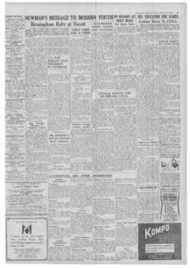Page 6, 19th October 1945
Page 6

Report an error
Noticed an error on this page?If you've noticed an error in this article please click here to report it.
Tags
Share
Related articles
A Home Of One's Own Living In London On £3 A Week
Life In Tile Villages Is Not So Hard
Nazis Dislike Communal Feeding
Less Milk—
War Prisoners In Britain
OUR SPECIAL CORRESPONDENT 'ON GERMANY
umilllw FROM PAGE ONE
weeks this remnant received only half a loaf of bread per person. There was, of course, no fat, no meal, no potatoes or milk available for them as Germans. At the end of August there were hardly any snwIl German children left alive
in Stettin. • Whilst the Germans starve in these two great cities, the Russian-sponsored Warsaw Government is arranging she transfer of the University of Vilna to Stettin and the University of Lvov to Breslau. Altogether, the Warsaw Government claims to be able to settle fourand-a-half million Poles from beyond the Curzon Line in the German territories east of the Oder. For this purpose well over ten million Germans are being evicted..
By the beginning of June the great migration from Czechoslovakia was also well under way. By the middle of July one hundred thousand refugees driven out by the Benes Government had reached Cottbus alone. The refugees from democratic and humanitarian Czechoslovakia told the same story as those from Silesia : they had been summarily evicted and allowed to take with them what they could collect and pack in ten or twenty minutes. Catholic priests related that they had been given halfron-hour in which to leave their parishes.
The great influx of refugees from Silesia and Czechoslovakia into the areas west of the Oder and the Neisse meant that the native population was threatened with having all its food stocks consumed and faced with famine long before the winter started. In June the native population of Goerlitz was getting two pounds of bread per person per week. By the first week ,of July this meagre ration had to be reduced to half-a-pound per week. No other food was available for distribution.
Is it surprising that in the towns and villages of Saxony, Pomerania and Brandenburg. which once had notices forbidding Jews to enter. the mayors now put up signboards warning refugees from Silesia or Czechoslovakia, their own flesh and blood, that they will receive no food and must not stay more than twenty-four hours ?
Eye-witnesses told me of desperate mothers pulling 'up grass and cooking
it. tier theit famished children. The rigours of the long trek. the tack of food and the sorry welcome they ro ceived from their fellow-countrymen made many of the refugees apathetic, and instead of going on further west, they would turn round and trudge back tO the town from which they had been turned away perhaps a week before. In this long, weary starch for food and shelter, many of the older people and _most of the young children succumbed
to disease and exhaustion. But that was in the summer.
What will happen to the five-and-ahalf millions whom the Russians are now going to " transfer" this winter ?
IN AND NEAR BERLIN District Nurses' Report Conditions in the western areas of the Russian zone are not always much better than in the Oder region, Whilst in Berlin, I heard surprising stories of famine conditions in put4ly agricultural districts. In a country town of Brandenburg with .a population of only five thousand, people wore reported to be starving because no food was coming in from the surrounding country. The Russians, who everywhere take most of the cattle and the horses, had here taken most of the food as well. And these are the areas which arc supposed to shekel and nourish the fifteen or ,more million men, women and children who arc being driven across the Oder and the Czech frontier.
Take another area not far from Ber lin, the town of M . In Southern Pomerania. I have before me the report of the district nurse, who came to Berlin to get medical supplies. There is no doctor left in the place and Germans are no longer admitted to the local hospital. In this once-prosperous agricultural, area there is a calamitous shortage of food. Only people working on the agricultural combines, formed by the Russians from the Junkers' estates get an occasional dole of bread. But no fat, salt, sugar
or flour is ever distributed. In most of the villages there has not been a drop of milk since the Russians drove off the cattle. Only 50 per cent. of the fields could be sown this year and of these the 'Reseialis are requisitioning 60 per cent. of the harvest. This will leave 2p per cent. of the normal harvest for the Germans and whatever Poles turn up during the winter. By August 15 almost al the habits and smaller children had died owing to lack of milk. Among the women the mortality rate is also very high. 80 per cent.
of the women and girls over thirteen have been infected with gonorrhoea after being raped by Russian soldiers.
What arc conditions like in the Russian section of Berlin ? This question is not easy to answer. It is true that outwardly conditions have improved a bit since the British Americans and French have taken over sectors of occupation there. The feeling of insecurity which obtains everywhere under Russian occupation, has given place to a perhaps unfounded trust in the ability of the Western Allies to prevent the worst aspects of Russian totalitarianism from becoming usual in Berlin. But even in the British and American sectors distinguished Germans still continue to disappear at night. The explanation given, and accepted, by most people in Berlin is Shat they have been kidnapped by the Russians.
ABDUCTION OF PRIESTS AND OFFICIALS Case of Mgr. Marquardt A particularly flagrant case is that of Mgr. Marquardt, the Vicar-General of Ermland in East Prussia, who was kidnapped in daylight from the American sector.
Mgr. Marquardt had been arrested in Frauenburg, the seat of the Bishop of trmland, and taken to lnsterburg. Here be was kept in prison for months although he was a sick man. Finally, he was released and went to Allenstein to administer the See of Ermland in the absence of Bishop Koller, who had been exiled to Halle by the Gestapo and not permitted to return by the U.P.U.
But the Jewish Voivode of Allenstein, appointed by the Warsaw Government, and the Vicesvoivode, declared an atheist, were opposed to Mgr. Marquardt's presence in Allenstein and his permit to remain there was not renewed. He was able to make his way to Berlin. 'On the way youths of the Warsaw Militia repeatedly climbed into his train to plunder and beat up the German passengers. Mgr. Marquardt himself was twice beaten and robbed
of his coat. waistcoat and shoes. In Berlin he was given shelter and medical treatment in the Catholic Hospital at Tempelhof, which is in the American sector.
About the middle of August a Russian captain arrived by plane at the Tempelhof aerodrome, went to the Catholic hospital and demanded that Mgr. Marquardt should fly back with him. to East Prussia. The reason given was that Mgr. Marquardt was needed to identify and explain some documents. He was to be brought back to Tempelhof in a few days. Despite the protests of the hospital authorities, Mgr. Marquardt was carried off and nothing has been heard of him since. Although this abduction of a Catholic dignitary took place in the American sector, the American authorities seem unwilling or unable to prevent it Among the Catholic laymen arrested and deported by the G.P.U. are the following judges and Civil Servants, none of whom was even a nominal member of the Party: President of the Reich Social Insurance Board, Dr. Schulte-Holthausen ; Dr. Weber, Vice-president of the Supreme Court of Prussia; Dr. Kuhnigk and Dr. Alwin Bauer, both of them judges in the Suprefne Court ; and the Public Prosecutor, Herbert Michalka. The arrest of .Michalka by the G.P.U. is particularly significant. When Heydrich, the so-called " Butcher of Bohemia." was shot by .Czech patriots, Himmler decided that an attempt should be made on Prime Minister
Churchill. It was Herbert Michalka who managed to warn the British Government of this plot.
The presence of British and American officers in the administration of Berlin makes them at least formally responsible for the arrest and deportation of innocent men by the G.P.U.
What happens to the Germans who are deported to Russia ? T was told the story of some 1.600 East Prussians, men and women between the ages of sixteen and sixty, who were taken over a thousand miles into _Russia and set to work in a tank factory well beyond the Volga. After working twelve hours a day on a diet of watery soup, they had to sleep on the floor ot the factory. In the morning they would parade, awaiting the arrival of the commissar, who would ask them : " Have you slept well ? " The answer prescribed was: " Very 'well indeed." Then the com
missar would say: Have you had pleasant dreams ?" and the deportees would answer in unison : "Very plea sant indeed !" Despite the solicitude of the commissar, over 800 of the original 1,600 German deportees died of starvation and exhaustion within three months.
blog comments powered by Disqus







